

Group 5 Facillitation - ceharmon - University of Mississippi Mail. Group 5 Facilitation - ceharmon - University of Mississippi Mail. How Do I Know They've Learned Anything? V2N1: Garfield. Joan B.
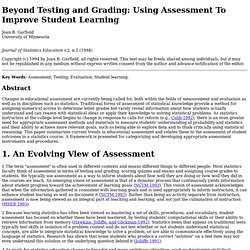
Garfield University of Minnesota Journal of Statistics Education v.2, n.1 (1994) Copyright (c) 1994 by Joan B. Garfield, all rights reserved. This text may be freely shared among individuals, but it may not be republished in any medium without express written consent from the author and advance notification of the editor. Key Words: Assessment; Testing; Evaluation; Student learning. Changes in educational assessment are currently being called for, both within the fields of measurement and evaluation as well as in disciplines such as statistics. 1 The term "assessment" is often used in different contexts and means different things to different people. 2 Because learning statistics has often been viewed as mastering a set of skills, procedures, and vocabulary, student assessment has focused on whether these have been mastered, by testing students' computational skills or their ability to retrieve information from memory (Hawkins, Jolliffe, and Glickman 1992).
Why don’t students remember what they’ve learned. Curricula and assessment aren’t designed with memory in mind We’ve all had the experience of cramming for an exam and forgetting most of what we learned within a few weeks or days.

In the immediate term, this is actually quite useful, because national exams are often bunched together, sometimes several in the same day. How Well Do You Think Standardized Tests Measure Your Abilities? Test-Taking Cements Knowledge Better Than Studying, Researchers Say. The research, published online Thursday in the journal Science, found that students who read a passage, then took a test asking them to recall what they had read, retained about 50 percent more of the information a week later than students who used two other methods.

One of those methods — repeatedly studying the material — is familiar to legions of students who cram before exams. The other — having students draw detailed diagrams documenting what they are learning — is prized by many teachers because it forces students to make connections among facts. These other methods not only are popular, the researchers reported; they also seem to give students the illusion that they know material better than they do.
In the experiments, the students were asked to predict how much they would remember a week after using one of the methods to learn the material. Several cognitive scientists and education experts said the results were striking. The final group took a “retrieval practice” test. Dr. Www.tn.gov/education/assessment/doc/tsteststrategies. Teaching Ahead: A Roundtable - What Are the Best Ways to Measure Student Learning? Archives. Why Students in Some Countries Do Better - Education Next. In the K-12 education market, where countries the world over publicly finance and manage the great majority of their schools, the institutions and policies established by various levels of government must create incentives for school personnel to use their resources in ways that maximize performance.
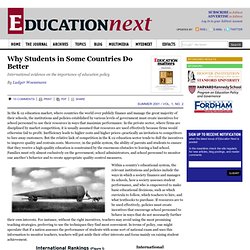
In the private sector, where firms are disciplined by market competition, it is usually assumed that resources are used effectively because firms would otherwise fail to profit. Inefficiency leads to higher costs and higher prices–practically an invitation to competitors to lure away customers. But the relative lack of competition in the K-12 education sector tends to dull the incentives to improve quality and restrain costs. Moreover, in the public system, the ability of parents and students to ensure that they receive a high-quality education is constrained by the enormous obstacles to leaving a bad school.
International Evidence Data Results. Testing - Testing, Assessment, And Excellence. The mad rush to embrace high-stakes testing says to me that we are now reaping what years of superficial indifference have sown.
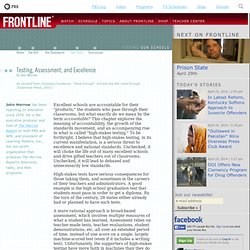
That is, for years educators have not held themselves accountable, so now business leaders and politicians are creating systems to hold schools accountable. As I will explain, the move to create standards is out of synch, and we're now testing with a vengeance, before the system has had time to get ready. ... Behind the Standards The push for standards began in force back in 1988, when President George Bush called the nation's governors together for the first-ever National Education Summit, held on the campus of the University of Virginia. Out of that largely theatrical meeting came a set of national education goals, some of which were actually written in the White House basement months later, some of which had been decided upon beforehand. Goals begot standards, and here the White House has taken a back seat. How Should We Measure Student Learning? The Many Forms of Assessment. Linda: The United States is at a moment where it could really transform its assessment systems.
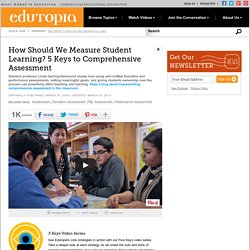
Most of our testing is multiple choice tests, pick one answer out of five, which is something you will never do in applying knowledge in the real world. Using Standards and Assessments:Why Standardized Tests Don't Measure Educational Quality. W.
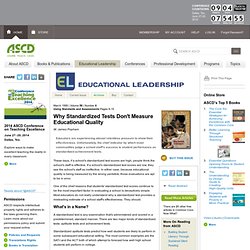
James Popham A standardized test is any examination that's administered and scored in a predetermined, standard manner. There are two major kinds of standardized tests: aptitude tests and achievement tests. Standardized aptitude tests predict how well students are likely to perform in some subsequent educational setting. The most common examples are the SAT-I and the ACT both of which attempt to forecast how well high school students will perform in college. But standardized achievement-test scores are what citizens and school board members rely on when they evaluate a school's effectiveness. A Standardized Test's Assessment Mission The folks who create standardized achievement tests are terrifically talented. Such relative inferences about a student's status with respect to the mastery of knowledge and/or skills in a particular subject area can be quite informative to parents and educators.